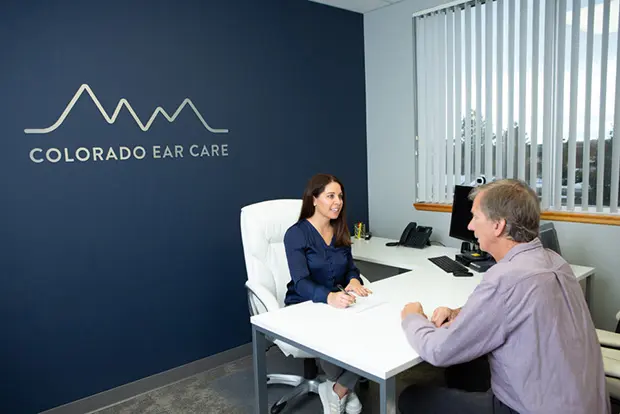October is National Audiology Awareness Month
Audiologists are one of the lesser-known types of doctors among the general population, as many people don’t encounter them until late in life when their hearing begins to diminish and their risk of falls increases. This is why the American Academy of Audiology created National Audiology Awareness Month, a whole month dedicated to promoting awareness of the audiology profession and encouraging proper hearing care.
While it’s true that we, as audiologists, serve a lot of older adults in our profession — after all, hearing loss is much more prominent with the older population — we see much younger folks and even kids sometimes, too. The reality is that hearing loss can develop at any age, and audiologists do a lot more than conduct hearing tests and prescribe hearing aids, too.
So, what does an audiologist do? Read on for three of the core ways we support the health of the communities we serve.
But first, a brief history of audiology
“Audiology,” by definition, is the branch of medicine that deals with hearing, and, up until 2006, a master’s degree was the highest required education in order to practice. Today, those looking to practice audiology must acquire an AuD, or a Doctorate of Audiology. This transition really changed the perception of audiologists among the general public and helped recognize audiologists as the advanced practice providers they are.
Audiology is sometimes confused with otolaryngology, which is the branch of medicine that deals with diseases of the ears, nose, and throat (ENT). Although both professions deal with ears, the main difference is that ENTs don’t normally diagnose or treat hearing loss itself, but instead treat underlying diseases or health issues that could cause hearing loss.
For example, if you’re struggling with hearing loss as a result of an ear infection, an audiologist might refer you to an ENT to treat the ear infection while they tackle the treatment of any long-term hearing damage on their own.
Like other medical professions, audiology providers are facing staffing shortages due to a higher number of practitioners retiring than can be replaced by graduating AuDs, but the profession is projected to grow by 10% over the next decade, so access to audiologists should soon improve.
So, what makes audiology unique, and what do audiologists do during their day? Let’s get into our three core responsibilities.
1. Diagnose and treat hearing loss
When a person starts to notice hearing loss, an audiologist is often the first call to diagnose and treat that hearing loss. An audiologist, with the help of other licensed hearing care specialists who work for the practice, will run comprehensive hearing tests and conduct examinations of the ear in order to determine whether hearing loss is present, the severity, and potentially the cause.
Once hearing loss has been diagnosed, an audiologist can then discuss treatment options. Some hearing loss is mild enough that it may not require a hearing aid to treat, and some added hearing protection, like custom earplugs, may be enough to slow the progression of the hearing loss for longer. And, in other cases, a hearing aid will be recommended as the best course of action.
2. Prescribe and fit hearing aids
While you don’t necessarily need to have an AuD to fit and adjust hearing aids for patients, most hearing aids require a prescription written by an audiologist, and audiologists in smaller practices will sometimes do hearing aid fittings themselves, as well.
Hearing aids can feel like a big step for many people, and a big part of an audiologist’s job is to support patients through the journey of selecting, being fitted for, and getting used to hearing aids. It’s a very personal journey that often comes with questions and significant adjustments, so having an audiologist who can ease the transition is crucial.
3. Diagnose and treat balance and vertigo disorders
AuDs are also trained in diagnosing issues with the vestibular system, which is responsible for balance in the body, but not all of them have the equipment and staff needed to treat balance disorders within their practices. Nevertheless, balance and vertigo are big parts of the general job description for audiologists, and most people aren’t aware that we can diagnose and treat in this area.
Many are surprised to learn the crucial role our ears play in our balance, and that’s why audiologists are often the first line of defense in diagnosing balance disorders or dizziness. Essentially, the vestibular system relies on a variety of receptors in the inner ear, like fluid levels and ear crystals, to keep our bodies balanced, and when something changes or these organs become inflamed, balance may be affected (and hearing loss can even develop, too).
While not all audiologists specialize in balance or dizziness, here at Colorado Ear Care, we have the most thorough and complete dizziness and vestibular testing in the state of Colorado, and we can diagnose and treat a variety of balance-related disorders. From equilibrium disorders to BPPV and fall risk prevention, our team of experts helps patients overcome balance and dizziness disorders and get back to a better quality of life.
–
Celebrate National Audiology Awareness Month with a hearing test at Colorado Ear Care!
If you live in the Denver or Boulder areas, our team would love to provide you with the hearing care you deserve. Reach out to our team to schedule an appointment today.

